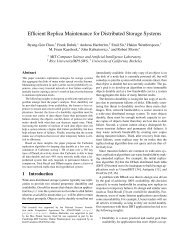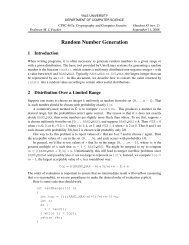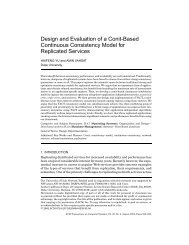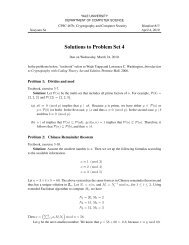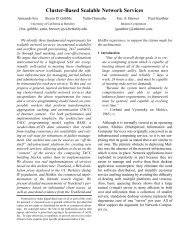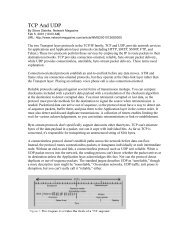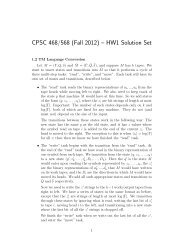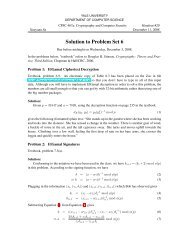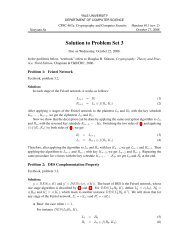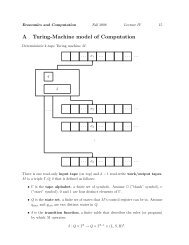Unreliable Failure Detectors for Reliable Distributed Systems
Unreliable Failure Detectors for Reliable Distributed Systems
Unreliable Failure Detectors for Reliable Distributed Systems
Create successful ePaper yourself
Turn your PDF publications into a flip-book with our unique Google optimized e-Paper software.
230 T. D. CHANDRAAND S. TOUEGChandra et al. [1992] answer this question by considering OWO, the weakestfailure detector in OW. Roughly speaking, OWO satisfies the properties ofOW, and no other properties. Chandra et al. [1992] show that OWO is theweakest failure detector that can be used to solve Consensus in asynchronoussystems (with a majority of correct processes). More precisely, Chandra et al.[1992] show that if a failure detector Q can be used to solve Consensus, thenthere is a distributed algorithm that trans<strong>for</strong>ms Q into O’WO. Thus, in aprecise sense, O’WO is necessary and sufficient <strong>for</strong> solving Consensus inasynchronous systems (with a majority of correct processes). This result isfurther evidence to the importance of O’W <strong>for</strong> fault-tolerant distributedcomputing in asynchronous systems.In our discussion so far, we focused on the Consensus problem. In Section 7,we show that Consensus is equivalent to Atomic Broadcast in asynchronoussystems with crash failures. This is shown by reducing each problem to theother.’ In other words, a solution <strong>for</strong> one automatically yields a solution <strong>for</strong> theother. Thus, Atomic Broadcast can be solved using the unreliable failuredetectors described in this paper. Furthermore, OWO is the weakest failuredetector that can be used to solve Atomic Broadcast.A different tack on circumventing the unsolvability of Consensus is pursued inDolev et al. [1987] and Dwork et al. [1988]. The approach of those papers isbased on the observation that between the completely synchronous and completelyasynchronous models of distributed systems there lie a variety of intermediatepartiah!y synchronous models. In particular, those two papers consider atleast 34 different models of partial synchrony and <strong>for</strong> each model determinewhether or not Consensus can be solved. In this paper, we argue that partialsynchrony assumptions can be encapsulated in the unreliability of failure detectors.For example, in the models of partial synchrony considered in Dwork et al.[1988] it is easy to implement a failure detector that satisfies the properties ofOW. This immediately implies that Consensus and Atomic Broadcast can besolved in these models. Thus, our approach can be used to uni@ severalseemingly unrelated models of partial synchrony.8As we argued earlier, using the asynchronous model of computation is highlydesirable in many applications: it results in code that is simple, portable androbust. However, the fact that fundamental problems such as Consensus andAtomic Broadcast have no (deterministic) solutions in this model is a majorobstacle to its use in fault-tolerant distributed computing. Our model of unreliablefailure detectors provides a natural and simple extension of the asynchronousmodel of computation, in which Consensus and Atomic Broadcast can besolved deterministically. Thus, this extended model retains the advantages ofasynchrony without inheriting its disadvantages.Finally, even though this paper is concerned with solvability rather thanefficiency, one of our algorithms (the one assuming a failure detector with theproperties of OW) appears to be quite efficient: We have recently implemented aslightly modified version that achieves Consensus within two “asynchronousrounds” in most runs. Thus, we believe that unreliable failure detectors can be7They are actually equivalent even in asynchronous systems with arbitrary, that is, “Byzantine”,failures. However, that reduction is more complex and is omitted from this paper.8The relation between our approach and partial synchrony is discussed in more detail in Section 9.1.




